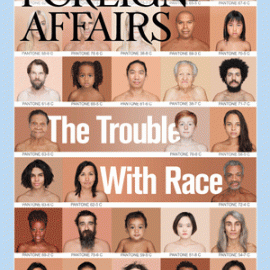Everybody knows that racial tensions have been at the center of American political debate in recent months, but the story of racial and ethnic division is actually a global one, with a long and tortured history. For the lead package in the March/April issue, therefore, we decided to do a deep dive into racial issues in comparative and historical perspective.
Kwame Anthony Appiah kicks it off with a sweeping review of the rise and fall of race as a concept, tracing how late-nineteenth-century scientists and intellectuals built up the idea that races were biologically determined and politically significant, only to have their late-twentieth-century counterparts tear it down. Unfortunately, he concludes, recognizing that racial categories are socially constructed rather than innate doesn’t make racial problems easier to solve.
Fredrick Harris and Robert Lieberman explore the paradox of a United States in which stark racial inequalities persist even as official and individual-level racism have dramatically declined: a country that might be postracist but is hardly postracial. They point to the influence of historical legacies that baked the racism of previous eras into the cake of contemporary institutions and practices, from housing to finance to criminal justice.
Kenan Malik looks at Europe’s disastrous experiences with multiculturalism, in which attempts to respect ethnic and cultural differences have spurred the very tensions they were designed to soothe. Deborah Yashar analyzes the curious case of Latin America, where race mixing was long considered a virtue rather than a vice, societies prided themselves on their colorblindness, and class trumped race as a ground for political mobilization. And James Gibson tackles South Africa, with its unique history and racial classification scheme, finding that although stark divisions among the races clearly weaken the country’s democracy, race relations there are improving as people of different backgrounds interact more frequently.
Finally, Graham Brown and Arnim Langer assess the world’s experience with affirmative action programs, which have been enacted in many places as a way of improving the lot of excluded communities. The lessons are clear, they conclude: such programs can occasionally help in the economic sphere, have a mixed record in improving social cohesion, and are an unmitigated disaster when it comes to politics.
Discussions of racial issues usually throw off more heat than light and too often assume that local distinctions and attitudes are universal and immutable rather than particular and contingent. We offer these world-class experts and their rigorous, context-specific analysis as an antidote.
You are reading a free article.
Subscribe to Foreign Affairs to get unlimited access.
- Paywall-free reading of new articles and a century of archives
- Unlock access to iOS/Android apps to save editions for offline reading
- Six issues a year in print, online, and audio editions
